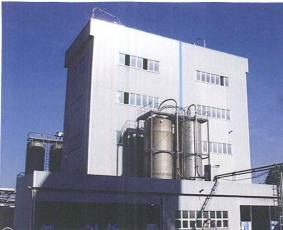Category : Featured Plants Manufacturer : Buhler AG Plant Type : SSP Capacity : 45 and 60 TD
45 t/d and 60 t/d
These are two technological lines for the manufacturing (additional polycondensation) of the bottle grade PET resin which is used in the production of popular PET bottles for beverages. They are based on the solid state polycondensation technology developed by the famous Swiss BUHLER company. The production process depends on thermal treatments of the raw material (amorphous polymer A-PET of the Initial IV about 06 dl/g) in the equipment of the lines. The lines consist of five basic process loops each, where the material is treated by the temperature in the specified conditions for the certain period of time. During processing amorphous material, its molecular weight changes to the value expected for bottle grade, or higher, up – even to 1.0 dl/g. There is ability to process R-PET materials on these lines, too. Beside the standard bottle grade we have experienced processing R-PET and the fiber grade homo-polymers to the values of 0.96 – 1.0. Nominal capacities of the lines were increased to the following values: Line 45 up to 60 t/d and Line 60 up to 76, 8 t/d. Main process Loops: -precrystalisation; -crystalisation; -preheating; -polycondensation; -cooling. The technological process is visualized by the drawing. On the stages of preheating and polycondensation, the process takes place in the atmosphere of pure nitrogen. This is for the protection of the material against the color degradation in high temperature conditions. The nitrogen loop is closed, equipped with a special cleaning system based on the Pt-ctalyst. This is a system where main byproducts of the process are removed from the gas. These byproducts are acetaldehyde and ethylene glycol. They are burned and transformed into environmentally safe water and carbon dioxide. The dust (which is a product of a constant friction of the pellets) has to be removed from the process gas, too. For that purpose, systems of cyclones and special type filters are installed there. The loop has to be constantly feed with pure, fresh nitrogen. The gas is dried in the Gas Dryer system. The process of solid state polycondensation is a continuous one. Friction of the pellets was eliminated as much as possible through installing specially constructed equipment. This helps to keep the material consumption at the lowest possible level and limit the amount of waste. For the production of 1000kg of the final product we need 1005kg of the raw material (amorphous PET). A complex of raw material silos (1 for 45 t/d & 1 for 60 t/d line) can store 120 tons of amorphous pellets. The final product complexes are also equipped with so called big – bag stations for each line with electronic scales that enable to pack the final product into special – 1000 -1200 kg big bags. Filling the auto-track-silo is possible, too. It is enabled thanks to the special equipment installed under the silo group. It is also possible to unload trucks with raw material deliverers straight to the raw-material silo as well as to feed the line straight from the big bags. The whole process goes in a hermetic equipment and is controlled by computer systems (Simens S-5, visualization on two independent PC’s on the Factorylink platforms). Additional control of the process is possible through sight-glasses placed on each equipment unit. It enables to reach stable quality parameters of the product.
Can't find what you need? Click HERE to contact us.
We sell Complete Plants and Process Equipment on a Worldwide Scale. LCEC has locations around the globe, which gives us the ability to acquire entire Complete Plants for relocation. If you need Ammonia, Nitric Acid, Urea, Hydrogen, Methanol or any other Process Complete Plant, our strategic positioning can help you fill your need. Please contact us for more information. Let LCEC find the Complete Plant or Process Equipment you require.






